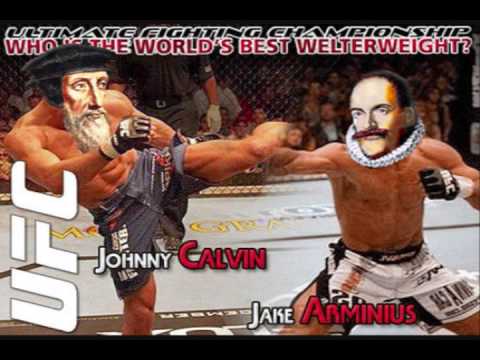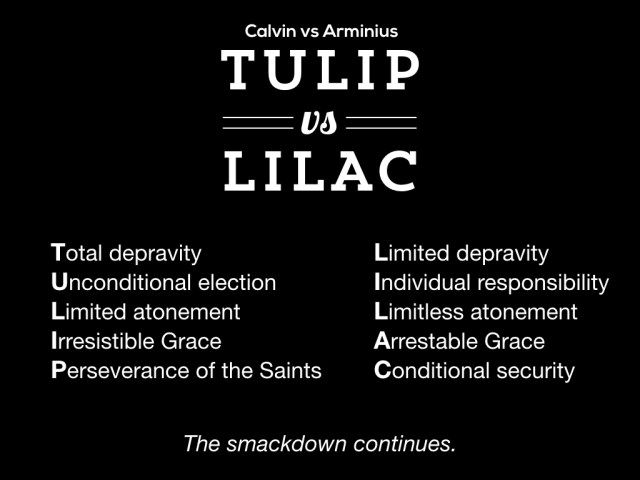Weighty theology made simple(r)


If there is a $64,000 question in the Christian faith it is predestination. When it comes to God, who chooses whom?
To consider this age old question look at the passage in John chapter 10 (vs 22-30) in which Jesus delivers one of his “ouch” comments to the religious. Jesus has just finished a sermon in which he used the metaphors that he is both “the door” to the town corral, and “the good shepherd” working for the sheep’s benefit. The religious leaders, upset at the implication that they are profiteering off of and abusing the “sheep,” chase Jesus from the lecture hall and press him: “Stop beating around the bush, are you the messiah or not?”
Like a professor on his way back to his office after a controversial lecture, Jesus stops to speak to these unreceptive students. “I have told you. And in case you missed the lecture, I hold healing labs every afternoon.” The religious leaders are absolutely irate at his answer (in vs. 31 they pick up stones to kill him). Jesus response is, “I’m more than the promised deliverer, I am actually one with the God who sent the deliverer to you…but you can’t understand that because only the chosen here my voice, and you simply aren’t among the chosen.” (v. 25-30) It is an uncomfortable passage – a first century mic drop.
First century sheep in a community corral knew their shepherd’s voice and followed them out to pasture as they sang. Jesus is not so much making an accusation as a statement of fact – those who lack relationship with him are unable to hear his voice. They don’t believe so they don’t hear. And because they don’t hear, they won’t follow. They are apart from him. Therefore, no one is protecting them from being snatched in the end – they don’t have eternal life. The bad news in the Good News is that while all may be invited to the party, not all will show up to it (Matt. 22:1-14). But, hurt feelings aside, Jesus answer raises a theological question that has not gone quietly into the night after some 500 years: When it comes to God, who chooses whom?
Jesus lobs up an idea here (and in many other places) that God is sovereign and chooses who will have faith. John 15:16 is the classic: “You did not choose me, but I chose you…“. But Jesus also offers up the opposite thought: “But to all who did receive him, who believed in his name, he gave the right to become children of God.” (John 1:12) Which is it? Does God choose humans, or do humans choose God? Christians on both sides of the question agree that God created humanity and, in the fulness of time, redeemed wandering humans through Jesus’ cross, and now initiates relationship with humans. But when it comes to the human response, is our response caused by God, or do we initiate our response ourselves? When we ask, “Who does the choosing?” we have two apparently contradictory ideas held up in the Bible: “Whoever believes in him has eternal life” (John 3:16), yet, “No one can come to me unless the Father…draws him” (John 6:44). So, again I ask, who is choosing? Jesus’ answers often raise more questions. He is a frustrating savior.
There is a tension between God’s initiative and human responsibility not resolved in the Bible. God draws, yet you and I are presumed to be responsible. God chooses. Yet we must choose. So is it our choice or God’s?
The theological terms for this question are monergism vs synergism. Is it God alone (monergism), or do humans play a role with God in salvation (synergism)? We’ve created entire theological systems around the question: Calvinists (who think it’s all God) have TULIP and Arminians (who think humans are “able”) have LILAC. Both systems are elegant in their internal consistency. Both bump up against the Bible at key points – all over are two seemingly inconsistent ideas: God is sovereign, in charge of the world and chooses you and I, and yet, you and I are accountable for our response to God. The very word “accountable” presumes that, since we are “able,” we are held to “account.” (Remember, the most basic Protestant tenant of biblical interpretation is to “assume the clear meaning of words.”)

It is a classic conundrum: If God knows all, is all powerful, and sovereign over all, what kind of free will do we have? If God is really all loving and allows us to choose, have we not saved ourselves? And if we save ourselves, did we really ever need God to begin with? Yet the scriptures, both Old and New, hold up both premises: God is sovereign. We must respond. I know what you are starting to think: Matt, quit dodging the question! But if scripture rather than my system be the foundation of the Christian life, I simply cannot.
Yes, some preachers commit to one system and some to the other. But the truth is that honest preachers can’t give the question of who’s doing the choosing a neat bow that explains all the scriptures’ teaching on this point. The Gospel is so simple a child can understand it, yet so deep that the most brilliant folk to walk the earth have spent their lives plumbing its’ depths. We just cannot tie a neat bow around the issue of God’s sovereignty and human freedom. We are in mystery here, and it would be wise to tiptoe at this point. Jesus said, “You did not choose me, but I chose you.” And we know that every page of the Bible implies that our choices count, or, as Joshua said, “Choose you this day whom you must serve.”
What I know is this: The bible tells us that God chooses. Full stop. And God tells us to choose him back. Full stop.
And that is, frustratingly, that.
Thanks for that TULIP vs. LILAC graphic. I had never heard of the LILAC acronym before, but it’s useful! I also fall into the “mystery” camp 🙂
It might have been a Roger Olsonism.
Oddly, this has been on my mind this week. It seems that choice must play a role. Consider Jeremiah 6:16 — “Stand by the roads and look, and ask for the ancient paths, where the good way is, and walk in it, and find rest for your souls.” But they said, “We will not walk in it.” Even in being called, it would appear that we have a choice. ” ‘Sell all that you have and give to the poor, and you will have treasure in heaven, and come, follow me.’ Disheartened by the saying, we went away, sorrowful, for he had great possessions.” Are we not called, but in the calling, have a choice whether to follow? although, “the gifts and calling of God are irrevocable.” I wonder if persistent might be substituted for irrevocable, especially if one considers (for example) Jonah, or even Moses (“But Lord …!”), or Ananias (“But Lord …” “Go!”).
Part of the issue is around terms. The Orthodox and Roman churches don’t divide between salvation and sanctification. Everyone assumes that sanctification takes participation.
Interesting; I’ve seen a different (and slightly contradictory) mneumonic for Arminianism, called FACTS.
http://evangelicalarminians.org/an-outline-of-the-facts-of-arminianism-vs-the-tulip-of-calvinism/
Nice.
“If God is really all loving and allows us to choose, have we not saved ourselves? And if we save ourselves, did we really ever need God to begin with?” I don’t understand that argument. It seems essentially akin to the following:
**A man is sick with a terminal illness. There is a medicine that can heal the man’s illness. If the man chooses to take the medicine he will be healed of his illness. The man chooses to take the medicine. On further reflection, the man decides that his choice to take the medicine was the key to his healing. On even further reflection, the man decides that he didn’t even need the medicine – he just needed to choose to be healed.**
On one hand you have the GC people wondering how Arminians can sing, “Mighty to save” and on the other we have Arminians who cannot understand how someone can pray for God to change someone else’s heart. When our systems overwhelm our scriptures we end up in strange places.
For the non dummies version see http://ridleyinstitute.com/election-and-predestination-a-brief-introduction/#more-603
I like the non-dummy version, except that the Molinists I know consider themselves a third option (and a most complex and philosophical one at that). To be lumped with Arminianism is anathema to my Molinist friends Who think of themselves as a solution to the Calvin/Arminian question of predestination/foreknowledge. If you want your head to swim, spend time with a Molinist! For the “even less dummy” read check out “Refreshing Grace” by John Correia.
the guy who wrote that piece heads up the Ridley Institute (training future clergy in a parish setting), holds theological degrees from Oxford, RTS, and is working on a PhD through a University in Belgium. Kind of a brainiac.
I do realize that.
He is right at the top of my list of favorite preachers.
Am I the only one who thinks that the answer to this puzzle is partly about the nature of time. Since God knew at the beginning of creation how it would all turn out, in one sense all is predestined.but that is because of the nature we have that lead us to make the choices we do make. That doesn’t mean that we don’t make choices, only that God knew what choices we would make before we made them.
For some. For others, though, foreknowledge is not the same as elected and pre-destined. One is initiated by God. The other merely observed.
I will be re-reading and pondering but this I do know: I love Paradox because it assures me that not only do i not have the answer, I will not find it “this side”! Paradox assures me that when dealing with the infinite and having a finite mind —- I CANNOT UNDERSTAND!! For now, I see through a glass darkly, but then………………… Paradox tells me that I am not supposed to get it, I am supposed to have faith and the more faith I choose the more faith I will be given. And to Stephen W. Houghton — Yes! We exist in finite time (linear), God exists outside finite time, is not bound by it, but we are.
Hi Nancy. Resurrection blessings to you as you pursue the One big enough to be held onto in the darkness.
As I read all these responses and further texts, I am reminded that Original Sin had something to do with wanting to be like God!